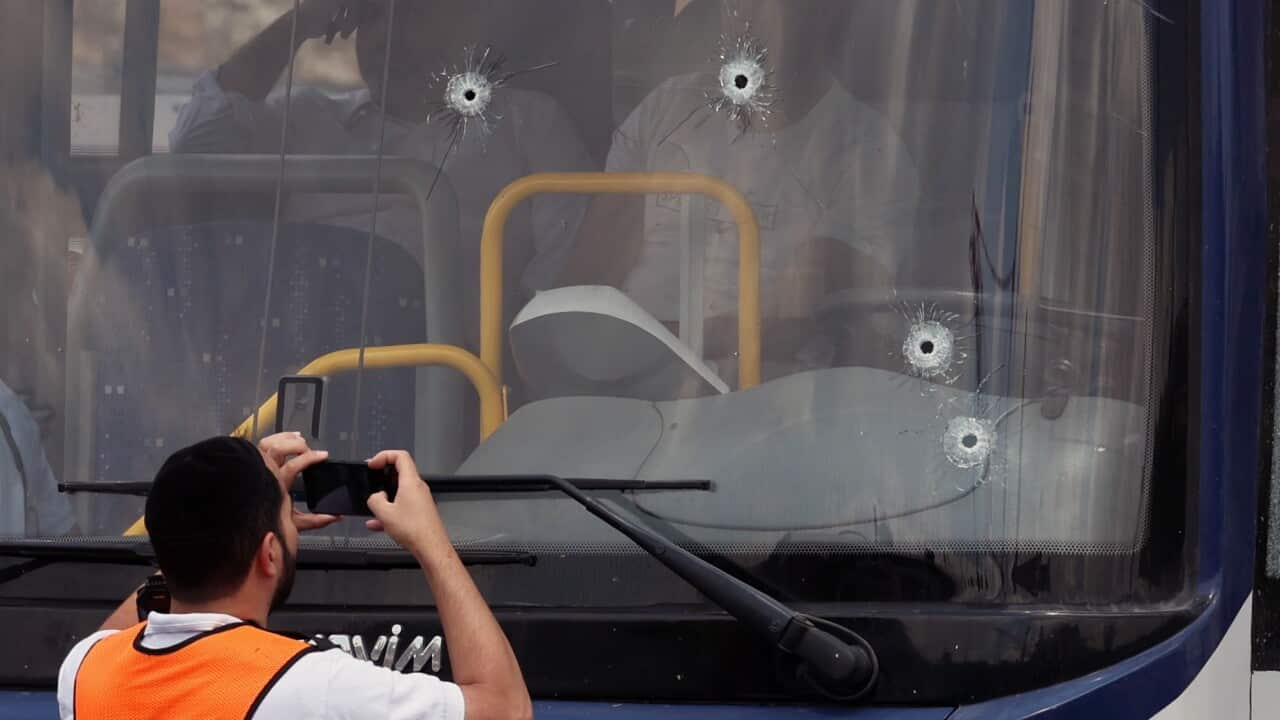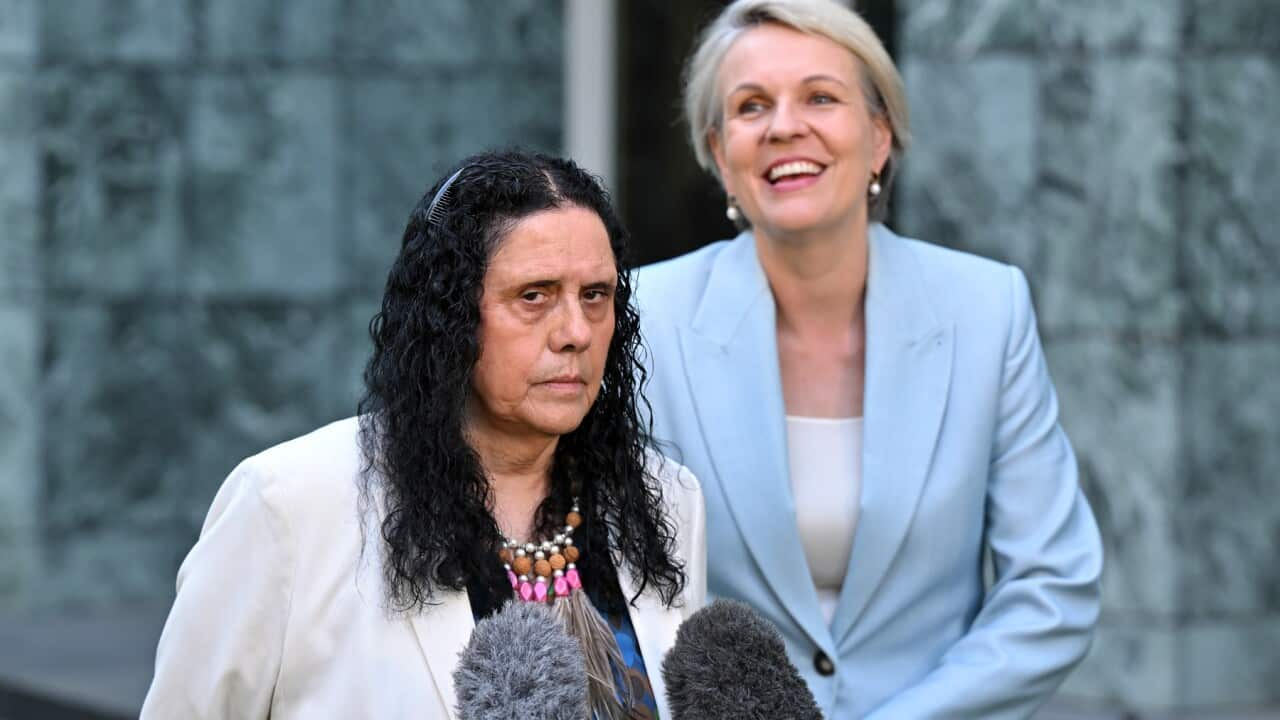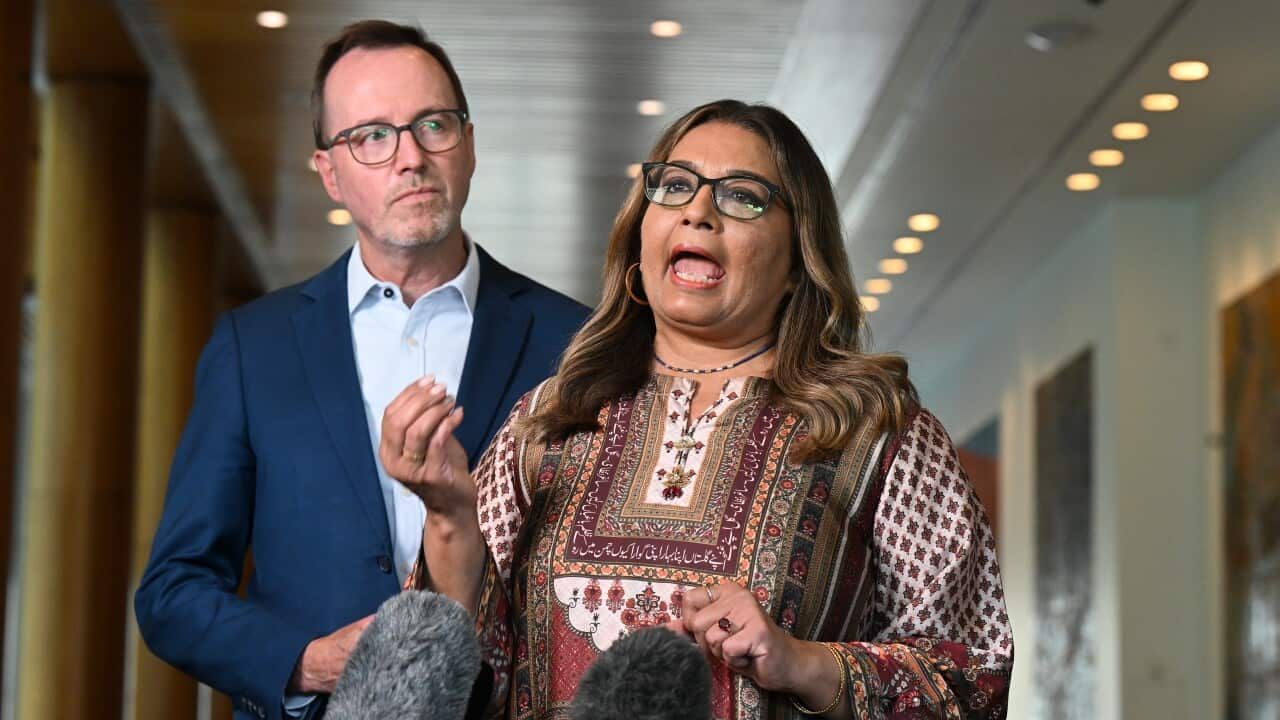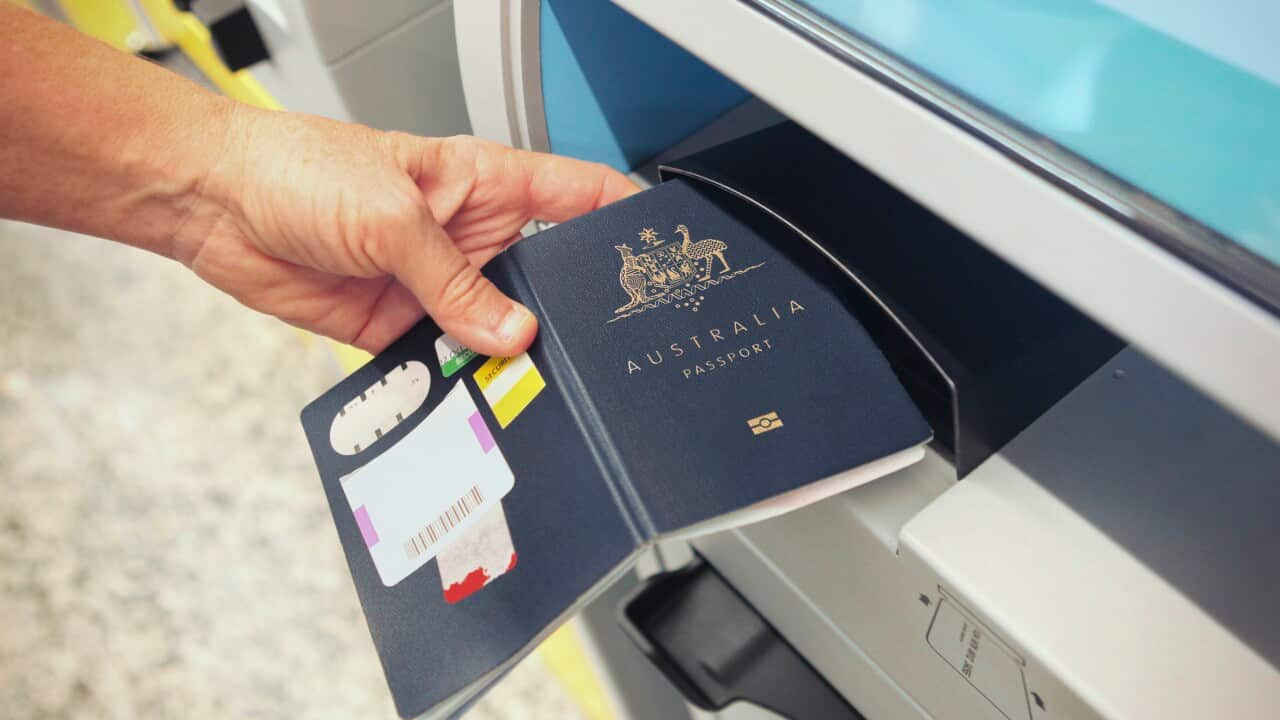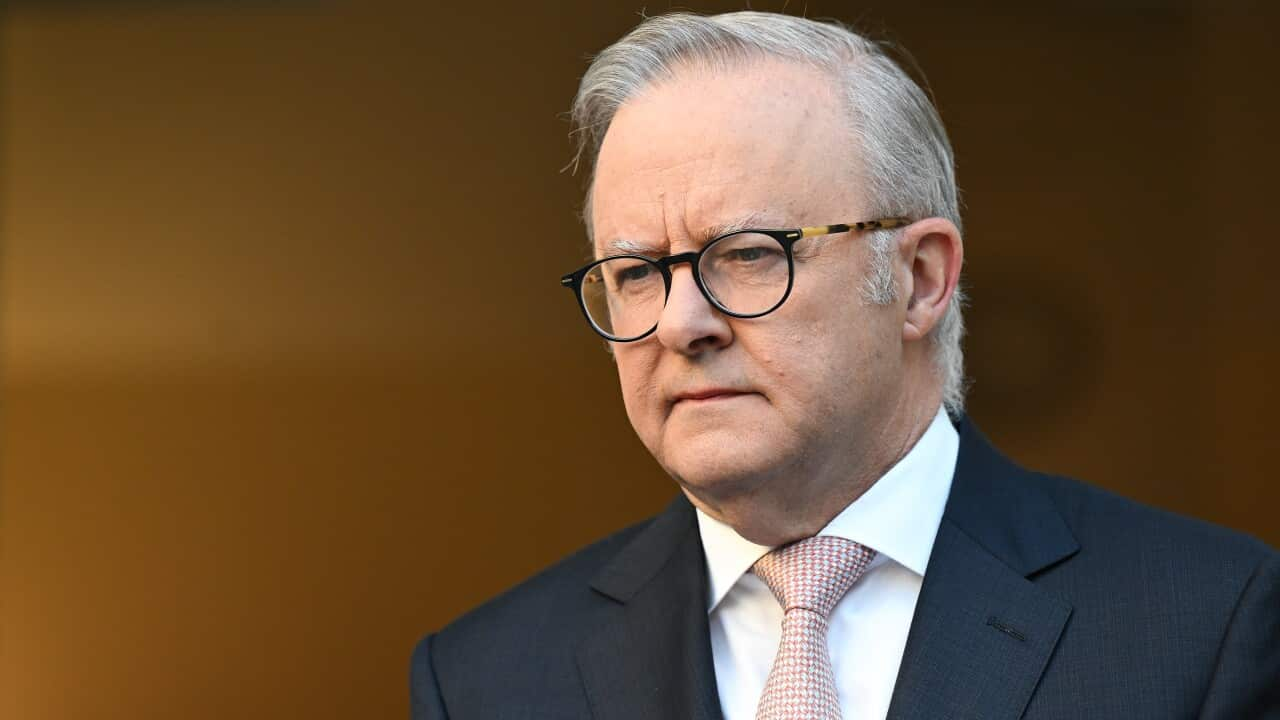Warning: This story contains details some may find distressing
Listen to Australian and world news, and follow trending topics with SBS News Podcasts.
TRANSCRIPT
At the Ramot Junction bus stop on the outskirts of Jerusalem, civilians run for their lives as gunshots ring out.
Two Palestinian gunmen have just opened fire on buses full of commuters.
Six people are dead and 20 injured.
Dashcam footage verified by Reuters shows pedestrians scattering in panic as buses stand abandoned and gunfire echoes through the junction.
Eyewitness Elazar Toledano describes what he saw.
“The station was, of course, full of the hustle and bustle of people. Suddenly, I started hearing a burst of gunfire, at first small, and then it intensified. People were looking at each other, trying to understand what was happening, but no one understood. Only maybe after two or three seconds, someone suddenly shouted 'terror attack!' and people started running.”
He says he saw several people get injured.
“While it was happening, I saw people falling or getting hurt while trying to escape. I saw a woman who suddenly fainted, and another woman who was bleeding, things like that. Then later, I returned to the scene and saw two tragic bodies, which really made me suddenly realise that this was a very, very serious event. Thank God I was spared.”
The ambulance service identified five of the victims as a 50-year-old man, a woman in her fifties and three men in their thirties.
It says six others are in serious condition with gunshot wounds.
The attackers were themselves shot dead at the scene by an Israeli soldier and a civilian.
Hours later, Prime Minister Benjamin Netanyahu arrived at the site.
Standing among the shattered glass and bullet-scarred buses, he says there will be retribution.
“We are at war, an intensified war against terror on multiple fronts. The war is also continuing in the Gaza Strip, where we will destroy Hamas, as we promised, and bring back our hostages—all of our hostages. We are now pursuing and surrounding the villages from which the terrorists came, and we will track down everyone who assisted them and those who sent them. We will take even harsher measures.”
The shock of the attack rippled through Israel’s political leadership.
From Budapest, Foreign Minister Gideon Saar joined his Hungarian counterpart at a press conference, describing the shooting as a test for the world.
“This morning, there was a horrific terror attack in our capital, Jerusalem. Two Palestinian terrorists murdered Jews on buses at the Ramot junction in the entrance to Jerusalem. So far, six Israelis have been killed. There are many, many injured, including pregnant woman.”
He went further, calling on all nations to choose sides.
“Every country must now make a clear choice. Are they on Israel's side, or are they on the side of the jihadists.”
As Jerusalem mourned, Mr Netanyahu shifted attention back to Gaza.
He says that fifty high-rise buildings, described as Hamas command posts, had been destroyed in airstrikes.
He also signalled that a ground operation was imminent, addressing Gaza’s civilians directly.
“I promised you a few days ago that we would bring down the terror towers in Gaza, that's exactly what we're doing. In the last two days, 50 such towers have fallen, the air force has taken them down. Now all of this is just an introduction, just a prelude, to the main powerful operation—a ground manoeuvre of our forces, which are now organising and gathering, into Gaza City. And so I say to the residents of Gaza, I'm taking advantage of this opportunity, and listen to me carefully: You've been warned, get out of there.”
But for many Gazans, leaving is not a real option.
With the borders with Egypt and Jordan closed, Gazans have nowhere to go.
They are surrounded by bombardment, shortages of fuel, and a blockade that has restricted food, water, and medicine.
But there is hope, as Israel's foreign minister announces that Israel has agreed to US President Donald Trump's ceasefire proposal.
“President Trump said it clearly yesterday, Israel said yes to his proposal. We are ready to accept a full deal that would end the war based on the cabinet's decision. Two things must happen. One, the return of our hostages. We will have, we still have 48 hostages kidnapped from their homes on October 7th. Being held in Gaza today. Second thing, Hamas must lay down its arms.”
At the United Nations in New York, the Secretary-General’s spokesman Stéphane Dujarric warned the escalation of military action in Gaza is costing more lives:
“The hostilities are continuing to kill and injure people over the weekend. In just the past 24 hours, the Ministry of Health in Gaza reported 67 deaths and 320 injuries. This brings the total of people killed since the end of the ceasefire in mid March to almost 12,000. Amid the ongoing offensive in Gaza, the Israeli military has issued more orders over the past days of people to leave specific buildings in areas within Gaza City, warning of imminent attacks.”
He warned that military action is exacerbating the food shortage:
“Meanwhile, over the past two days, at least one partner organisation has been hit in Gaza City, killing several people, including at least one aid worker and one child. Our colleagues reminds us that over 80 per cent of Gaza is either under displacement orders or within militarised areas designated by Israel. With the Israeli military instru - excuse me - with the Israeli military instructing people to move from parts of Gaza City southward, OCHA warns that people are in dire need of food, they're in dire need of water, and they're of course in dire need of shelter items.”
Israel blames Hamas for stealing aid shipments and blames foreign aid groups for failures in delivering supplies where most needed.
In Geneva, the UN’s human rights chief, Volker Turk, placed the crisis in a broader global context.
He tells the Human Rights Council that wars across the world are eroding the very foundations of international law.
“Excellencies, Israel's mass killing of Palestinian civilians in Gaza, its infliction of indescribable suffering and wholesale destruction, its hindering of sufficient life-saving aid and the ensuing starvation of civilians, its killing of journalists, UN staff and NGO workers and its commission of war crime upon war crime are shocking the conscience of the world. I am horrified by the open use of genocidal rhetoric and the disgraceful dehumanisation of Palestinians by senior Israeli officials.”
Mr Turk stopped short of calling the Gaza war a genocide, but stressed that Israel now faces a case before the International Court of Justice.
Israel rejects the accusations and denies it is committing a genocide in Gaza.
Israel says it only targets militants and blames Hamas for civilian casualties because the militant group - now largely reduced to a guerrilla organisation - operates in densely-populated areas.
As Mr Netanyahu promises harsher military action, and Mr Saar calls on the world to stand with Israel, the United Nations is appealing for restraint and accountability.
Between these competing narratives lies the reality faced by civilians: Israelis who fear being gunned down on their morning commute, and Palestinians in Gaza who face bombardment, hunger, and displacement with no means of escape.
